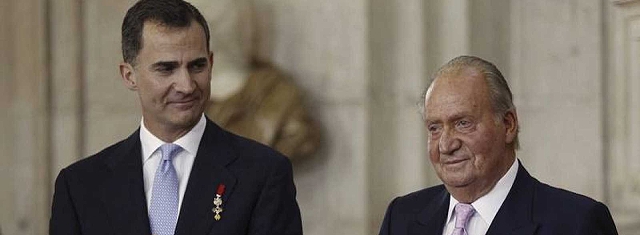Politics
Juan Carlos I goes into exile
Political harassment of the former King

Felipe VI and his father Juan Carlos I (Source: RTVE)
USPA NEWS -
The King Emeritus of Spain is exiled. The leader who piloted the transition from dictatorship to democracy in the mid-1970s and gave stability to Spanish politics from a conciliatory position, communicated this Monday to his son, King Felipe VI, his "thoughtful decision" to settle outside Spain to facilitate the monarch's exercise of his constitutional functions. "My legacy and my own dignity as a person lead me to make this decision," he points out in a letter to the current head of State.
The growing pressure from leftist and republican political parties - two of which currently occupy the Government of Spain - and the rosary of revelations about the supposed dark business of the King Emeritus, have put the Spanish Monarchy in a delicate situation. at a time when the country needs the moderating management of the head of State. Alleged commissions paid to Juan Carlos I by the Saudi monarch, for the works of the high-speed train from Medina to Mecca, and the existence of a fund in a tax haven, have deteriorated the image of the previous King and the parties of the left and Republicans have known how to take advantage of the occasion to attack the foundations of the State. An attitude not shared by the majority of the population, but the divorce between political parties and society worries legislators little when it comes to obtaining electoral returns.
The current King, Felipe VI, established firewalls against political harassment of the Monarchy. First he renounced his father's inheritance and then took away the economic allocation that he collected from the State budgets. But in recent weeks, after the complaints of a former collaborator of King Emeritus Juan Carlos I - Princess Corinna zu Sayn-Wittgenstein -, the Government of the socialist Pedro Sánchez pressured the Spanish Royal House to make a decision on the future of Juan Carlos I and delegations from the Zarzuela Palace, headquarters of the Royal House, and from the Moncloa Palace, headquarters of the Spanish Government, began to work together in search of a solution that preserves the monarchical institution and protects it from attacks by nationalist and republican sectors.
The solution arrived this Monday in the form of a letter from the King Emeritus to his son, King Felipe VI. "With the same eagerness to serve Spain that inspired my reign and in the face of the public repercussion that certain past events in my private life are generating," explains Juan Carlos I in the letter, "I wish to express to you my absolute availability to help facilitate the exercise of your functions, from the tranquility and calmness that your high responsibility requires. My legacy and my own dignity as a person, that's what they demand of me.“
"A year ago," continues the King Emeritus, "I expressed my will and desire to stop developing institutional activities. Now, guided by the conviction of providing the best service to the Spaniards, their institutions and you as King, I communicate to you my thoughtful decision to move, at this time, outside of Spain. [“¦] A decision I make with deep feeling, but with great serenity. I have been King of Spain for almost forty years and, during all of them, I have always wanted the best for Spain and for the Crown.“ And he says goodbye "with my loyalty as always, with the affection of always".
Shortly afterwards, the Royal House published a statement in which it reported that King Felipe VI wanted to “emphasize the historical importance that his father's reign represents, as a legacy and political and institutional work of service to Spain and democracy, and at the same time, it wants to reaffirm the principles and values on which it is based, within the framework of our Constitution and the rest of the legal system.“
The destination of the King Emeritus has not yet been announced. Juan Carlos I's father, Juan de Borbón, was exiled during the Franco dictatorship in the Portuguese city of Estoril. The French Riviera could be another probable destination.
Liability for this article lies with the author, who also holds the copyright. Editorial content from USPA may be quoted on other websites as long as the quote comprises no more than 5% of the entire text, is marked as such and the source is named (via hyperlink).





